Posts Tagged ‘justice policy’
Posted on: November 23rd, 2016 by Waterloo Region Crime Prevention Council
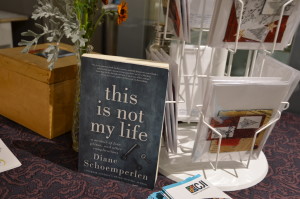 At first glance, Diane Schoemperlen’s memoir “This Is Not My Life: A Memoir of Love, Prison, and Other Complications” seems straight forward, in its own way, the stuff of TV shows and movies…. An author meets a fellow volunteer at a Kingston soup kitchen whom she knows has been is in prison, they become friends, they eventually develop an intimate partner relationship, they try to navigate the world inside prison and outside prison, they try to manage life together on the outside, the author leaves the relationship that has become abusive and spends the next six years healing and putting her life back together.
At first glance, Diane Schoemperlen’s memoir “This Is Not My Life: A Memoir of Love, Prison, and Other Complications” seems straight forward, in its own way, the stuff of TV shows and movies…. An author meets a fellow volunteer at a Kingston soup kitchen whom she knows has been is in prison, they become friends, they eventually develop an intimate partner relationship, they try to navigate the world inside prison and outside prison, they try to manage life together on the outside, the author leaves the relationship that has become abusive and spends the next six years healing and putting her life back together.
After spending an evening with Diane at the Turn the Page Book Club hosted by the Friends of Crime Prevention we have a deeper understanding of the complexity of this story. The story of their relationship covers tough issues tied to root causes of crime, such as family violence, sexual violence, and problematic substance use. Schoemperlen is unflinching in assessing her own motivations for staying in the relationship, as she comes to know the shadow and stigma that institutionalization casts over inmates and their loved ones.
Maybe slightly unorthodox for your average book club, Friends also brought together a community panel of Jennifer Hutton (Women’s Crisis Services of Waterloo Region), Chris Cowie (Community Justice Initiatives) and Shannon Moroney, author of Through the Glass to discuss the themes of the book in more depth and draw some direct applications to our community.
From the discussions between Diane & the panelist and the question/answer period with the community readers, we covered more content and topics than your average university course! Discussion ranged from childhood abuse/trauma to incarceration rates, from restorative justice to the lack of helpful prison programs, from reintegration challenges for released inmates to stigma faced by loved ones and family members of inmates, from abusive relationships to support networks for families of inmates, from the prison industrial complex to… well, I think you get the idea. Diane’s is a personal story that shines a light, not only on her own experience, but deftly directs a laser beam at the prison system in Canada. Diane skillfully tells a political story through her own story – a story that concerns us all.
Over the course of the discussion, people began to ask questions: What we can do to change a system that is clearly not working? Given that we have a federal prison for women right here in Waterloo Region, how can we help within our own community? How can we get involved?
We’ve pulled together a range of potential ‘calls to action’ and avenues for participating in creating change. Clicking on the links here will get you started.
If you decide to take some action, we would love to hear about it! Get in touch with Juanita Metzger to share your story.
Posted on: September 16th, 2015 by Waterloo Region Crime Prevention Council
One of the most anticipated highlights of our year happened last week. In case you happened to miss it (?!) – although, I’m not sure how you could – Howard Sapers was in town. Yes, THE Howard Sapers. Federal Correctional Investigator for Canada and ombudsman for federally sentenced offenders.
We partnered with Kitchener Public Library as part of their new 85 Queen Speaker Series to host this event and filled the auditorium with 230 people from our community. The action packed evening included a screening of the film “State of Incarceration”, a keynote address by Howard Sapers and a panel discussion with community members, including a formerly incarcerated woman from Grand Valley Institution for Women.
-
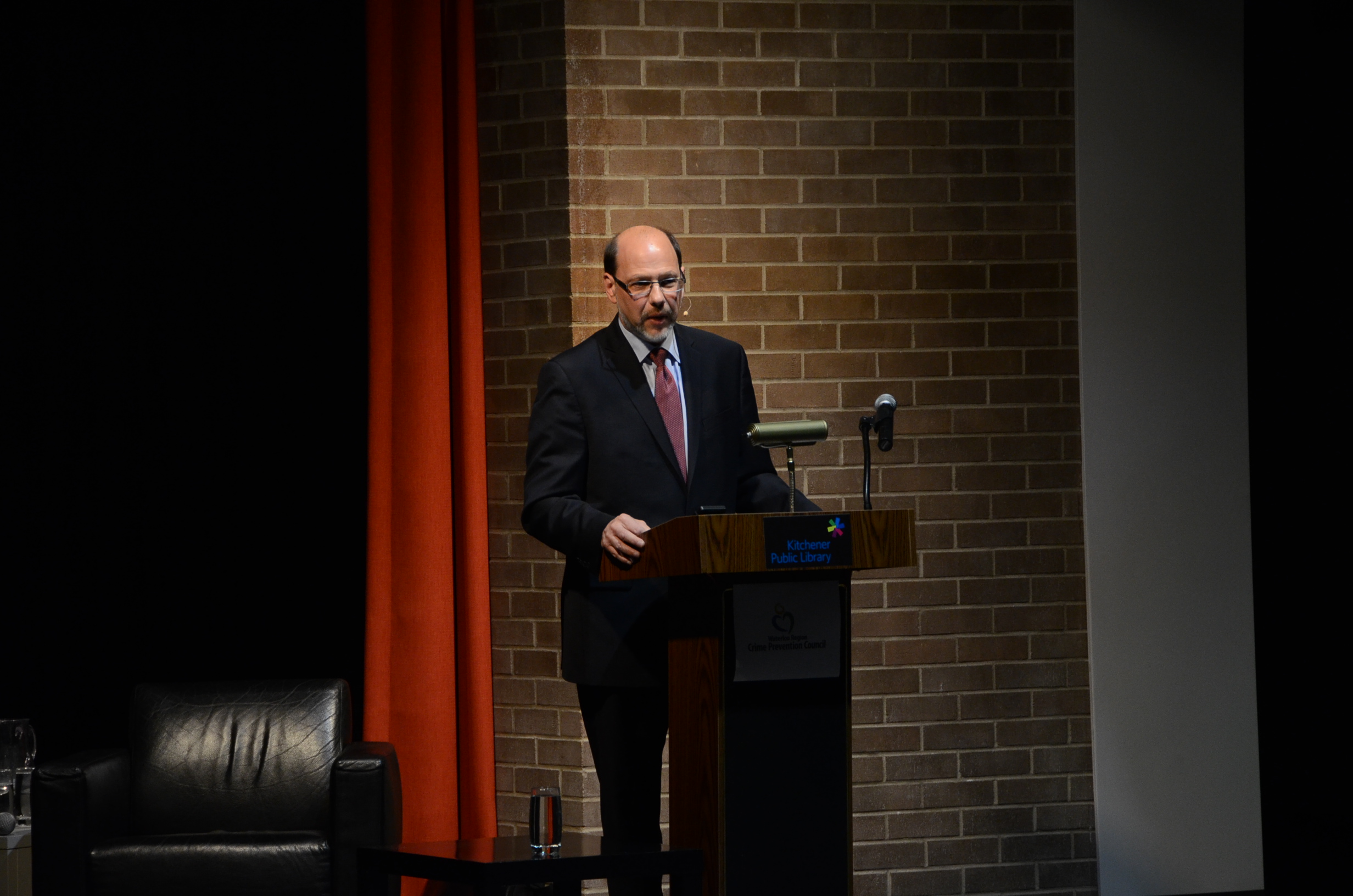
-
Howard Sapers oversees the Office of the Correctional Investigator, serving as an ombudsman for federally sentenced offenders.
-
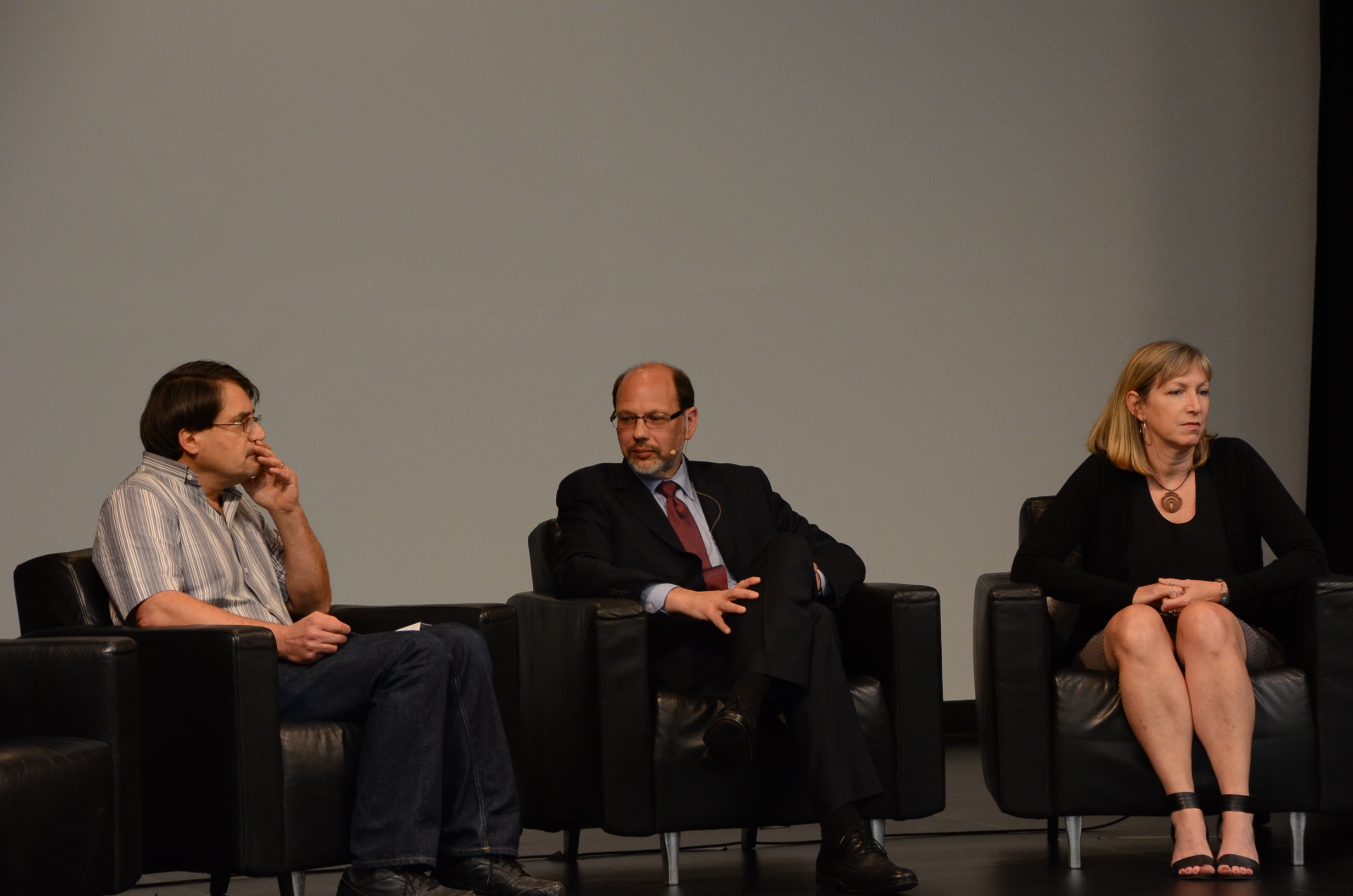
-
Panel with (from left) Chris Cowie from Community Justice Initiatives, (off camera) Joe Mancini from the Working Centre, Howard Sapers, Julie Thompson from CJI, and Dionne, (not seen, pseudonym), a former federal inmate.
-
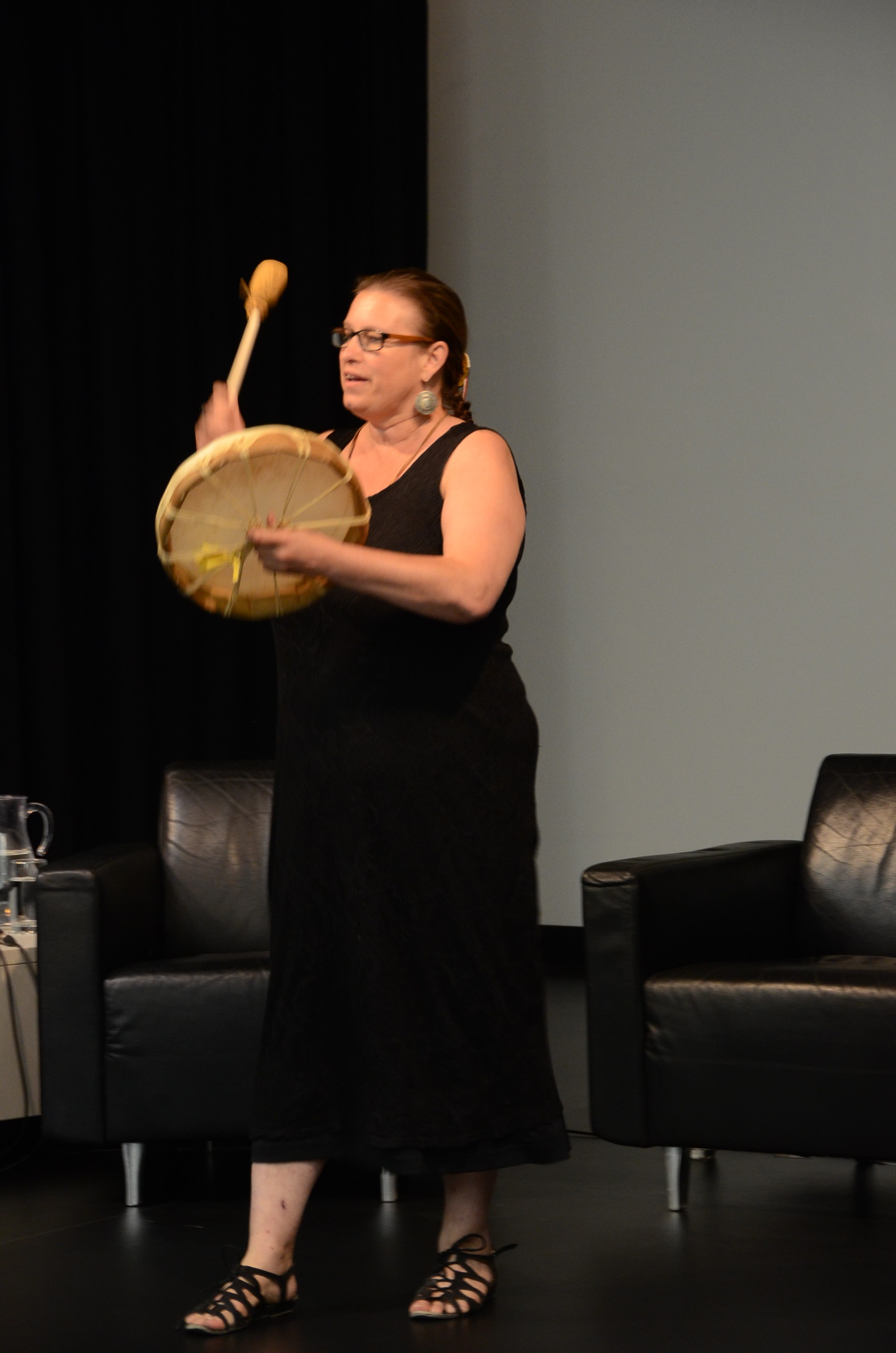
-
Aboriginal drummer Heather Majuary closed the event with drumming in honour of incarcerated Aboriginal lands.
-
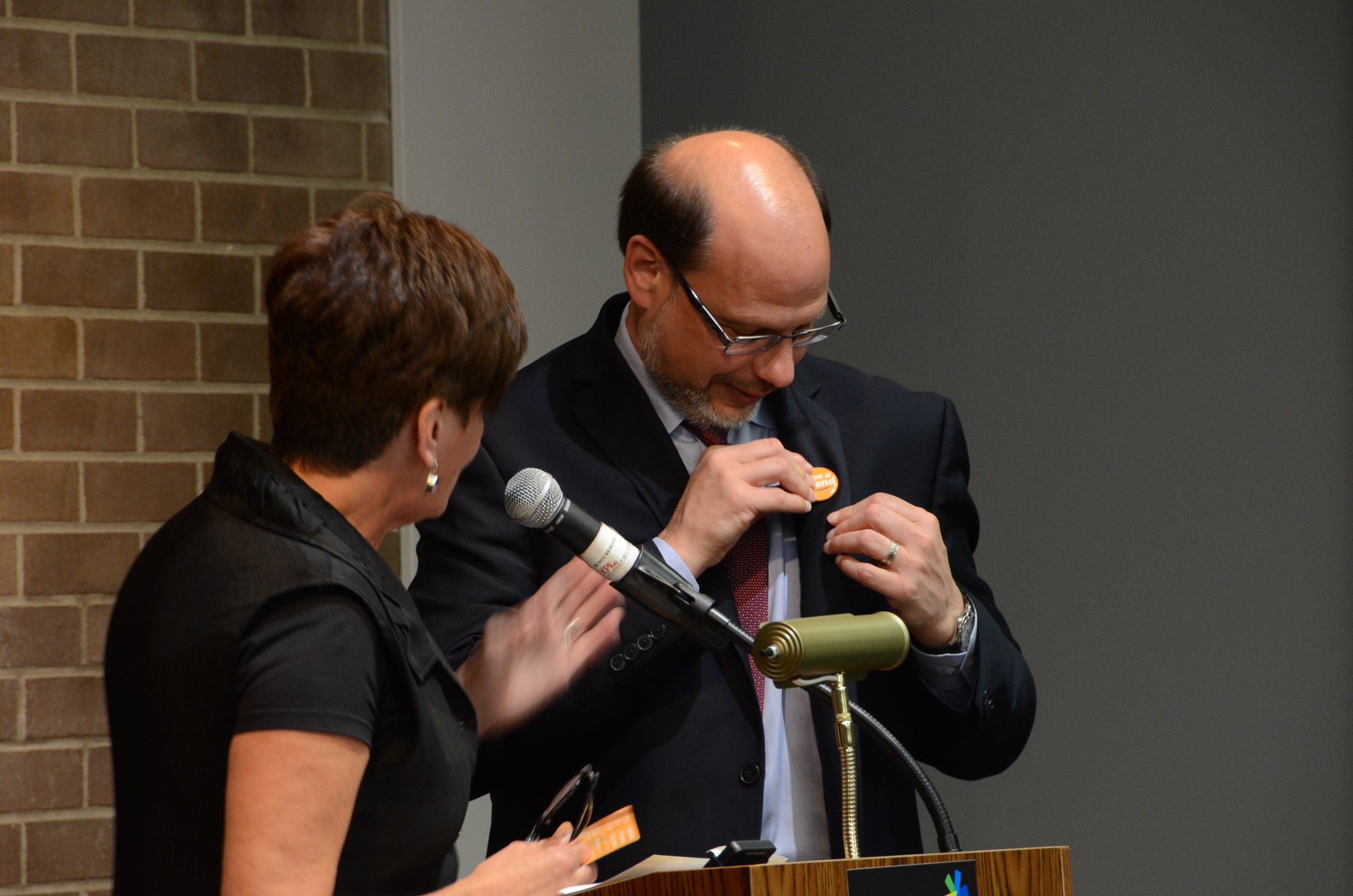
-
Howard Sapers becomes our first honourary Friend of Crime Prevention!
-
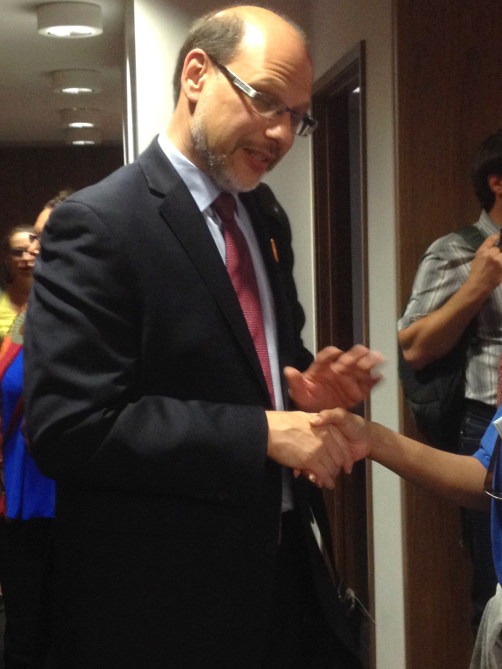
-
Howard Sapers chats with an attendee who is currently a minimum security inmate. [Source: Kitchener Public Library]
-
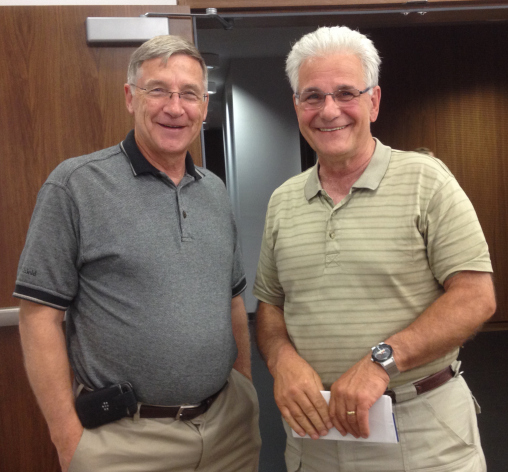
-
Regional Chair Ken Seiling with former parole officer Mark Yantzi, a pioneer in the field of restorative justice and past Executive Director of Community Justice Initiatives [Source: Kitchener Public Library]
-
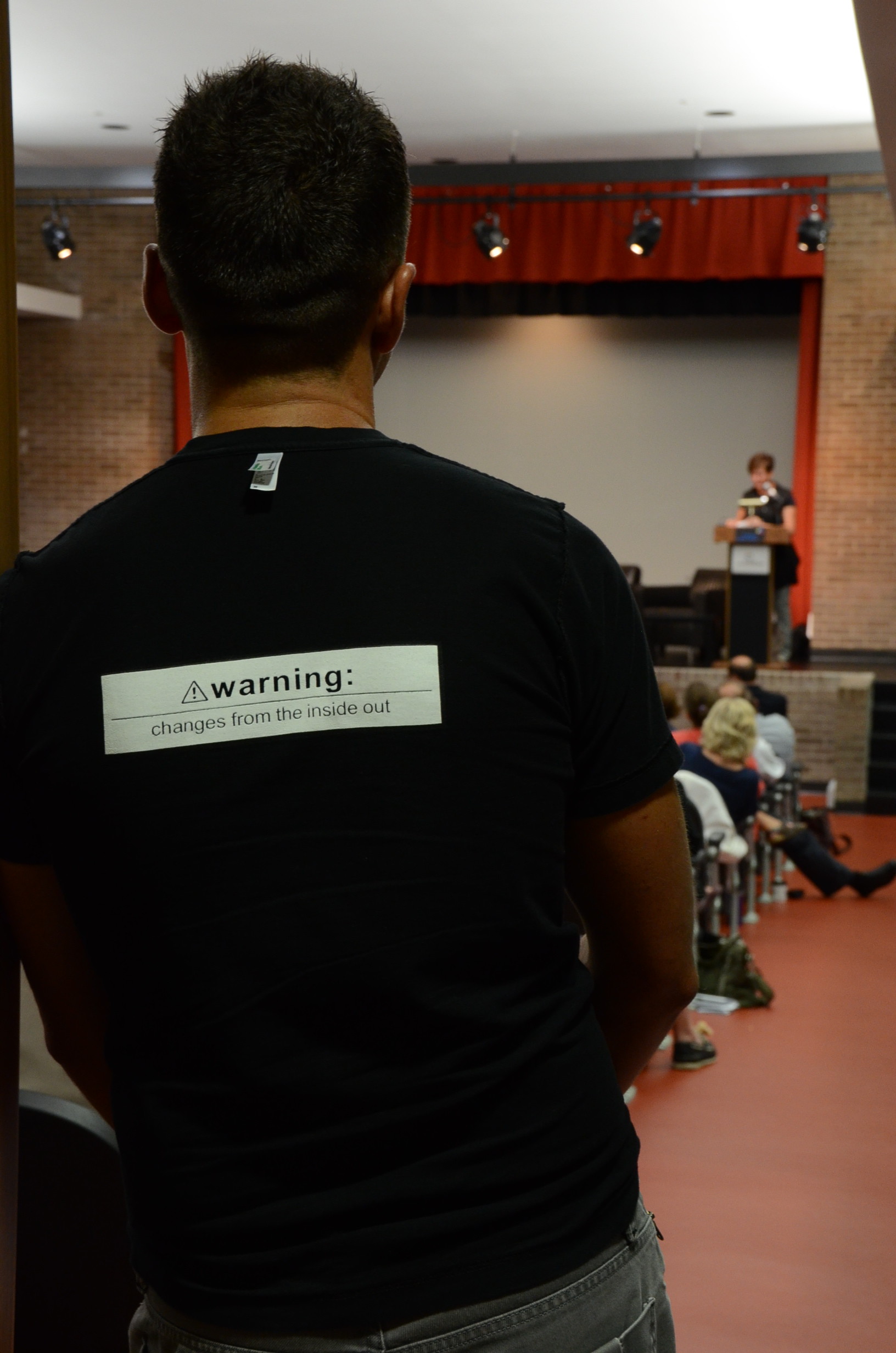
-
It’s true, change really does start from the inside. And that’s what Friends of Crime Prevention events are all about!
-
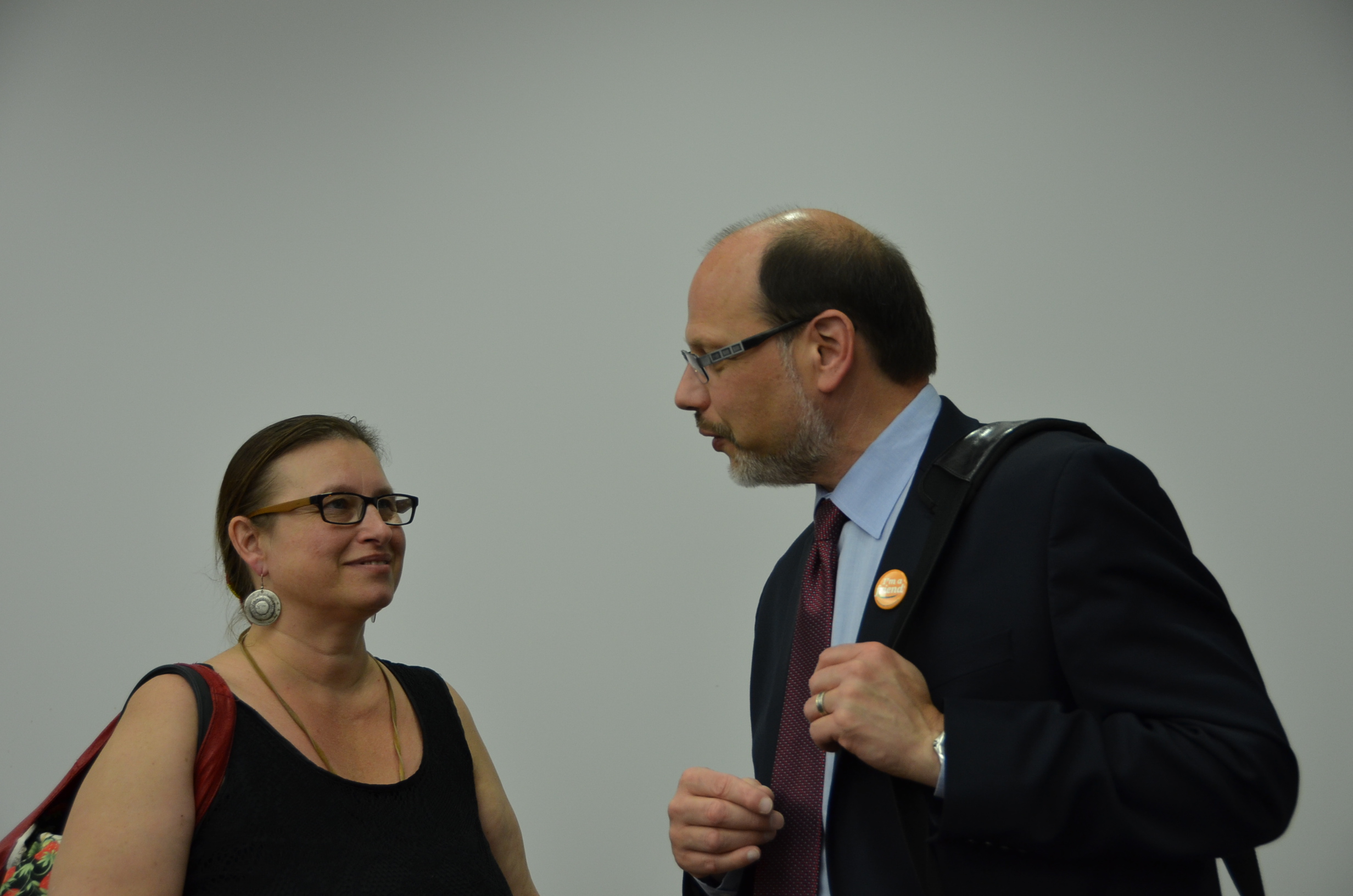
-
Howard Sapers chats with Aboriginal drummer Heather Majuary, who closed the event with drumming in honour of incarcerated Aboriginal lands
We have a video coming soon of Mr. Sapers’ keynote talk, but in the meantime, you can read his presentation here to catch all the incredible stats and stories he shared that night. He really does effectively paint a vivid picture about the state of Canadian prisons in 2015.
While you wait impatiently for the video, I”ll leave you with these two reflections from two currently incarcerated women from Grand Valley Institution for Women who attend the event. You’ll understand why it was such a big night.
Julie writes:
“I attended the forum for Friends of Crime Prevention, on September 10, 2015. I cannot begin to tell you how refreshing it is that discussions such as this are taking place. I was both shocked and pleasantly surprised at the amount of progressive people who attended the forum. There are faces and lives associated with the disturbing statistics Mr. Saper spoke of – mine is one of them. I was one of two currently incarcerated women at the event, with the Walls to Bridges Collective. Too often incarcerated people are treated as the rejects of society, disposable even, and let’s face it – advocating for us is not at the top of almost all priority lists. I firmly believe that many incarcerated people would not be in the criminal justice system to begin with, if they had been afforded access to and utilized stronger and earlier preventative measures through social intervention and more accessible social and health services; myself included. Sadly, I did not consider the flaws in our systems until I was directly affected. Now that I am, however, I cannot turn a blind eye to them anymore, not just for myself, but for the staggering amount of other people making up those statistics, and for those yet to come. I am relieved to know I am not alone in this quest. All human life has value – thank you for making “out of sight” not be “out of mind” anymore. The forum helped to humanize us and highlight some of the injustices of our daily reality. I left with a renewed sense of hope and purpose. I am thankful that this forum created a safe place for people to come together, ask questions, and push boundaries. To evoke much needed change will require more bridges to be built than walls. We have a long way to go, but I am hopeful that just as a storm starts with a single raindrop, so too does change start with forums such as this one.”
Denise writes:
Just as the world will always remember September 11, 2001, in a negative light, Thursday, September 10, 2015 will be etched in my mind for as long as I exist as an achievement to social awareness. You see, since my incarceration it was the only day in which I came in contact with people besides volunteers and members of the Walls to Bridges group and voice my dilemma while feeling safe to bare my soul. Mr. Howard Sapers provided statistics that were both daunting and hopeful. Information on how tax dollars are truly spent to build and house a growing prison population at a time where the crime rate for the past decade plus has been on the decline. I am part of those statistics and Canada is following the footsteps of the failed American system that ex President Bill Clinton and present sitting President Barak Obama stated ‘is not working’. The large majority of incarcerated people will be released and upon their discharge, are expected to function and contribute to the same society that deemed them as criminals. If education is at least a gateway to success, incarcerated people need more training to learn and utilize skills and tools required to help them successfully add to the fabric of society’s fast paced, ever changing existence. Prevention, Prisons & Popcorn at Kitchen Public Library was a forum that brought together a community of progressive thinking people aware of the challenges society will surely be faced with once the voiceless, faceless people are unconstrained. An awareness of prisons and the need for community inclusion upon the release of prisoners are part of an encompassing subject tax payers don’t realize every member of a community may be accountable for. After someone goes from inmate to civilian because they have paid their dues to a faulty justice system and they no longer live in the past where they made poor choices, when do they get a fair shot at being seen in a new light? There needs to be more discussions such as the one Prevention, Prisons & Popcorn opened up where communities are aware of their interconnectedness to their surroundings, even their walled surroundings.
Yep, it was that kind of night.
Posted on: April 7th, 2015 by Waterloo Region Crime Prevention Council
Back in February 2015, the Church Council on Justice and Corrections (CCJC), released a very promising evaluation report on the Circles of Support and Accountability (CoSA) program that operates across Canada. CoSA is a “community-based reintegration program, grounded in restorative justice principles, that holds sex offenders accountable for the harm they have caused while assisting with their task of re-entry into communities at the end of their sentences”.
The evaluation, the first of its kind in Canada, gives an in depth description of how the program works, documenting it’s success rate and cost savings due to reduced recidivism and reoffending. In short, the evaluation says that this program works.
Great news!
But then, on March 2nd 2015, it was announced that as of March 31, 2015, Correctional Services Canada (CSC) would not renew the funding it has been providing since 1996, as a partner to CoSA. The program has additional partners in numerous Canadian cities such as the Mennonite Central Committee Ontario (MCCO) for the program operated in Kitchener, Hamilton and Toronto. MCCO has funding from CSC until March 31, 2018.
CoSA Canada quickly released a statement to clarify and restate the real impacts of this program: a proven model that addresses a high risk crime against vulnerable people in a humane and accountable way and shows that it can reduce recidivism of the highest risk sexual offenders by 70 – 83%.
This is what we at the Crime Prevention Council would be inclined to call a “smart on crime” approach to reducing crime and victimization:
- the program is based in good evidence,
- the approach is measured and documented in similar ways across programs,
- it has produced excellent results,
- it is proven to reduce and prevent further crimes at a lower cost than keeping an individual incarcerated for “life”, and,
- helps to reintegrate individuals into our community, which is where 95% of people exiting prison, including those convicted of sexual offenses, will return eventually at the end of their sentences
Meanwhile, this ‘made in Canada’ approach has been successfully exported to a number of jurisdictions in the U.S. and the U.K., in addition to France, The Netherlands, Italy, Australia, New Zealand, Latvia and South Korea.
When programs show that they accomplish what they set out to do at comparatively low investment and provide a high return on investment to the safety of our community, their sustainability is not only vital, but smart and it makes so much more sense to support of them rather than cut them.
As such, the decision by CSC to cut funding for CoSA is tough to understand and needs further dialogue and consideration.
 At first glance, Diane Schoemperlen’s memoir “This Is Not My Life: A Memoir of Love, Prison, and Other Complications” seems straight forward, in its own way, the stuff of TV shows and movies…. An author meets a fellow volunteer at a Kingston soup kitchen whom she knows has been is in prison, they become friends, they eventually develop an intimate partner relationship, they try to navigate the world inside prison and outside prison, they try to manage life together on the outside, the author leaves the relationship that has become abusive and spends the next six years healing and putting her life back together.
At first glance, Diane Schoemperlen’s memoir “This Is Not My Life: A Memoir of Love, Prison, and Other Complications” seems straight forward, in its own way, the stuff of TV shows and movies…. An author meets a fellow volunteer at a Kingston soup kitchen whom she knows has been is in prison, they become friends, they eventually develop an intimate partner relationship, they try to navigate the world inside prison and outside prison, they try to manage life together on the outside, the author leaves the relationship that has become abusive and spends the next six years healing and putting her life back together.







